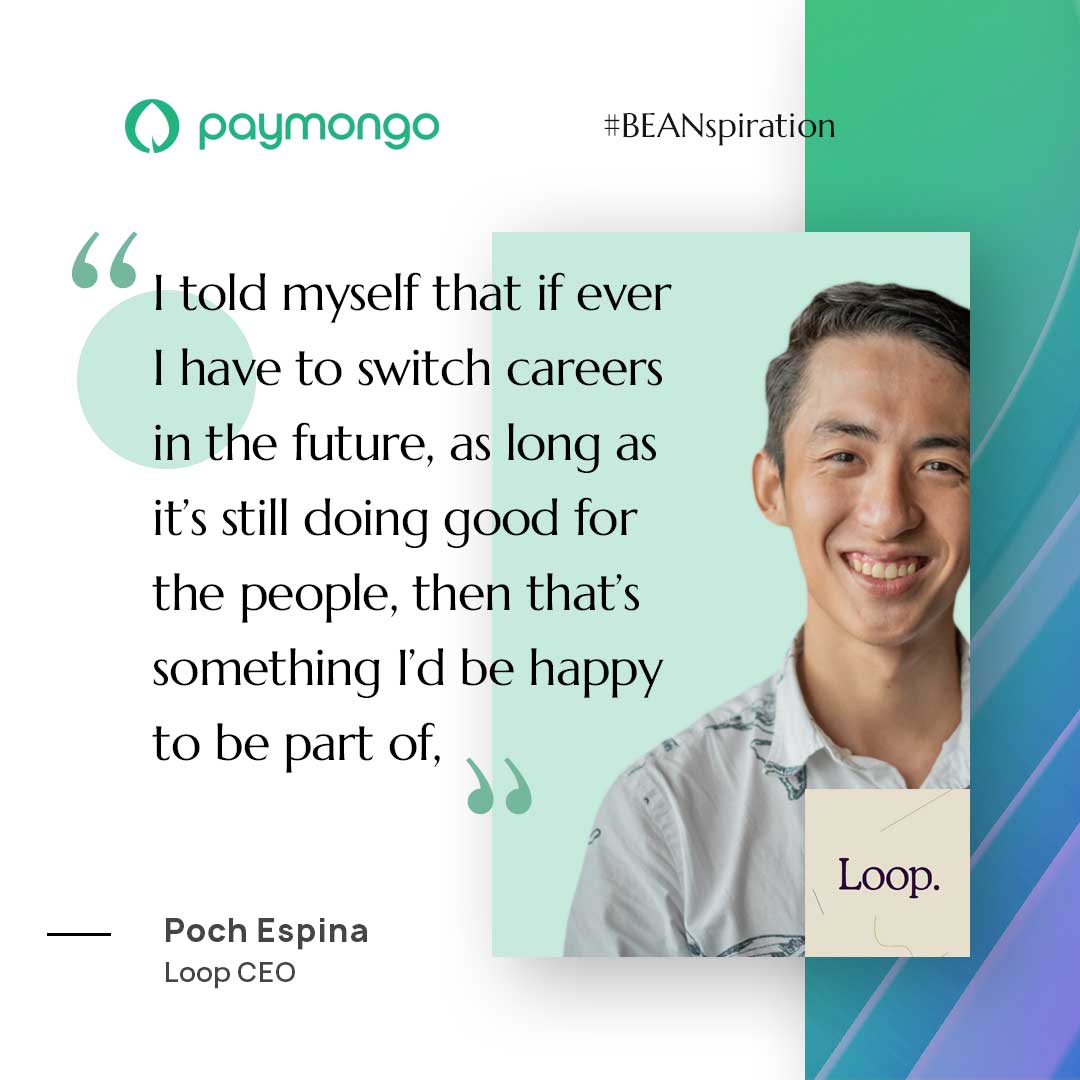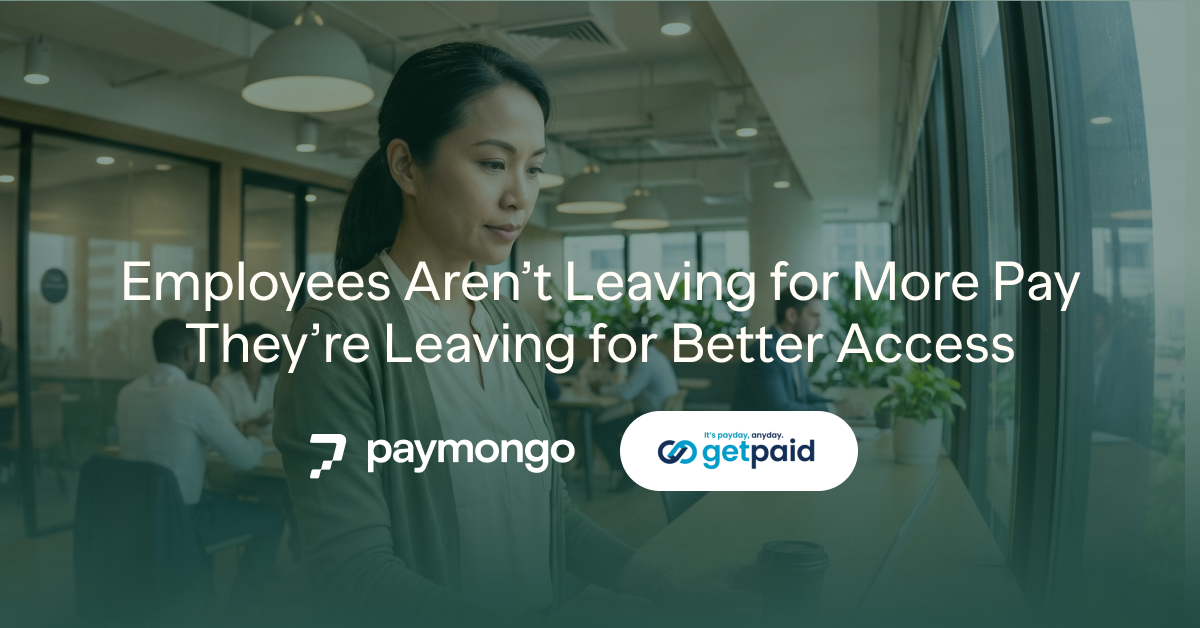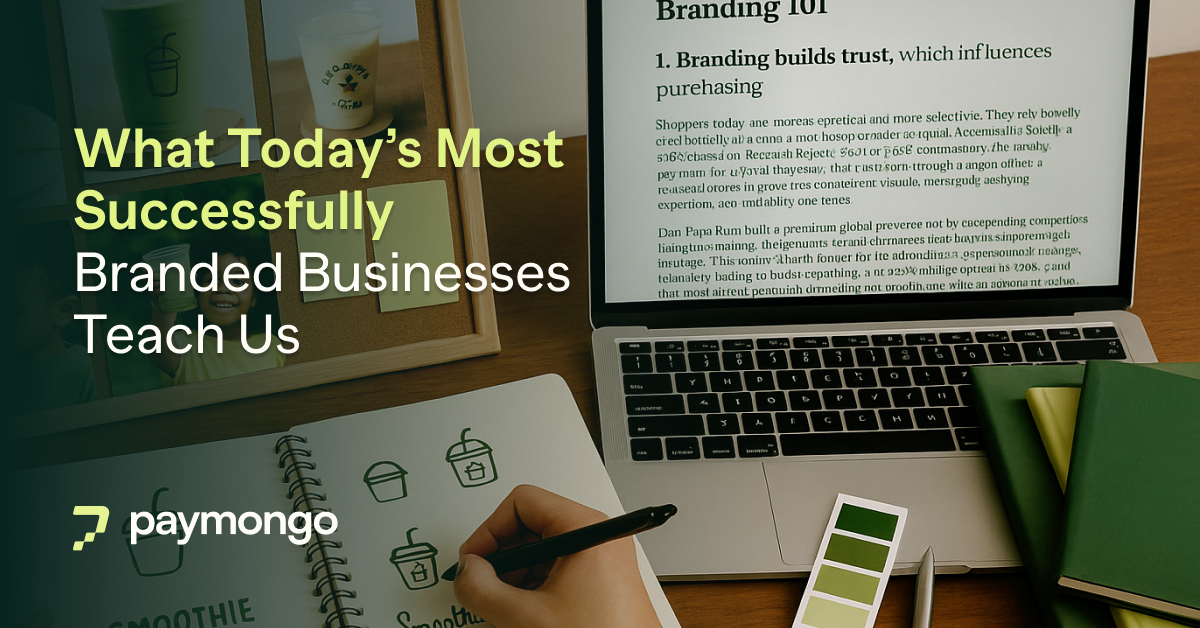Loop: Leading a collective of sustainable startups

Table of Contents
Poch Espina says that his first enterprise was “born out of frustration.”
It was during college that he found himself underwater off the coast of the occasional local beach for a student diving org, ISDA. He joined in early 2012, and by 2016, he noticed a stark difference had revealed itself.
“Imagine, in the span of just 4 years, there was an obvious difference, the increase in the amount of trash. That was something that really sparked it for me that, okay, ‘Why would I not do anything about this?’” he said.
Poch was studying Health Science and had intended to go into Medicine, but his career path shifted when he started Sip during his last year in college. He began selling metal straws wrapped in cloth pouches to do his part in going against the growing plastic waste problem.
“I told myself that if ever I have to switch careers in the future, as long as it’s still doing good for the people, then that’s something I’d be happy to be part of," Poch said.

Poch recalled that he felt like Sip was handed to him on a silver platter. To him, it was about having the right product at the right time. He began expanding his network, forming relationships with environment-oriented individuals while researching the latest innovations in sustainable goods.
“I got lucky. It blew up beyond what I ever thought it could amount to,” he said.
By 2021, the horizon has thoroughly expanded beyond Sip. When the "hype" behind reusable straws began to fizzle out, Poch realized that there was still so much more to do with their platform. With his team, he established Loop, an environmental collective of online stores curated by himself and his partners.

Loop is a collective of over 20 stores and growing, established in 2018. While Sip battled pollution, Loop targets the system of unsustainable consumption. It’s easy to get drawn into each category the enterprise has to offer.
Taking food out? How does a sugarcane clamshell container sound? Beauty and care comes in the form of bamboo toothbrushes and frankincense oil. Even your pets get to munch on abaca chew toys, their feet protected by shea butter-based paw wax.

It's "a marketplace of curated essentials".
The idea behind Loop is simple: your everyday items have sustainable alternatives, check them out.
Expanding and learning
Social media is a must for any online business to thrive. Poch, at 24-years-old, acknowledged his vigorous networking in the recognition of his first enterprise, Sip, and later on, for Loop.
“I was able to create a network of people that believed in the environment. They were my early adopters, my champions. They would talk about it, they would share it, And I think that that was a really big deal. All these networks were set up early on and I never thought that putting it on social media, sharing it with my friends, would be one of the key things that made it take off beyond my wildest imagination,” he said.

As the importance of marketing becomes more evident, Poch said the amount he had spent on online advertising since 2020 exceeds P70,000. In fact, social media platforms are areas in which he finds some stores that've been recruited into Loop’s community.
“I would say at least 30-40% of our brands come from just me scrolling down my feed and I’m checking out these stores, exploring them, finding out if I know someone, asking them what they know about the brand, and then eventually onboarding,” Poch said.
It was through the creation of Loop that Poch's team truly defined a strategy for the business. As Sip was thrown into a whirlwind of hype amidst the growing trend of metal straws, Poch admitted: “We were very sabog (unorganized).”
In the process of expanding Sip, Poch and his team had diverted the enterprise through multiple sales channels, dividing the focus of the company. As a result, it became more and more difficult to innovate upon their thinly-spread business model.
While creating Loop’s online store, they grounded themselves on what they did well. Though B2B had become more prominent as they tried to expand Sip, B2C became Loop’s priority, and it has stayed that way since.
Tools for growth
The transition to B2C was a great choice in hindsight as well, given that COVID-19 would hit B2B activities a year later. However, the introduction of apps such as Shopify and online payment platforms like PayMongo streamlined the many bumps that would normally befit online selling, even more so nationwide.
“Shopify is a drag and drop, you pick a template, you put your information, you put your product, and then just like that, you have a system. In 2020, I was really able to push Shopify to help us make a better website,” Poch said.
Eager to begin selling immediately, Loop used Shopify to bypass the many hassles of starting their own website. The use of additional apps and plugins allowed Loop to cross-sell alone, have product reviews and bundle purchases which have “increased average order value for customers.”
Of their payment platforms, Poch says that PayMongo accounts for approximately “20% for [Loop’s] exits, the highest other alternative being COD.”
Besides wanting to support a local initiative, Loop opted to include PayMongo due to its low pre-VAT, which in comparison to an international platform, allowed the company to save about P10,000. The additional savings in the form of input tax proved to be a must-have for Loop, as it easily integrated into their accounting system as well.
“I’m glad that the dashboard is very simple. The onboarding was smooth. It’s everything I really expected from an internationally-oriented start up. As a B2B tool, it’s as good as it could be, simply because it’s integrated into Shopify already,” Poch said.
Despite its incredible growth and its leading voice in the industry, Loop continues to value the importance of education in pushing back against climate change.

“If you really had to boil down the numbers, the straws are a very small aspect of the problem. A bigger part of the problem comes from agriculture, food waste, carbon emissions from transportation, from power. The straw thing is a very small aspect, and even all these reusables won’t solve climate change, definitely not. It’s just a part of it. That’s why education will always be the bigger thrust at the end of the day for these types of advocacies," he said.
With almost five years in the industry and the experience of managing an enterprise amid a global pandemic under his belt, goals have never been clearer:
"Our goal for 2021 is to focus primarily on retail and other efforts to improve our customer journey. But what excites me are new products that come up since we already have quite a line-up for the next few months. So definitely, something to look forward for everyone!"
For Poch, it’s in the little tweaks that he finds joy: from cleaning up Loop’s website for customer convenience, inviting their customers with a call to action in each delivery, or upgrading their packages from paper bags to boxes.
“Small improvements go a long way. It builds up. That’s the great thing. That’s why I found so much fulfillment in it, because it’s clear. Clear that I’m doing something. I know it’s wrong, I change it; it’s still wrong, I change it. Then finally, I get it right. It’s an exciting experience,” Poch said. 🌱
Subscribe to the PayMongo Blog
Join thousands of business owners in getting the latest financial insights




.png)

